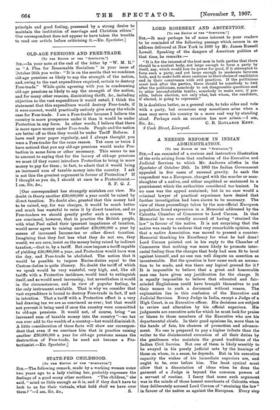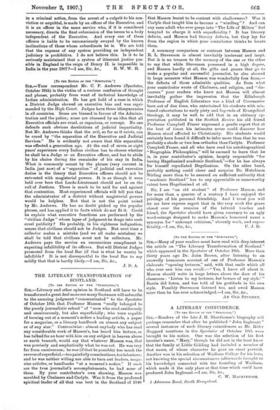A NEEDED REFORM IN INDIAN ADMINISTRATION.
[To THE • EDITOR OP THI " SPROTATOR.1 am reminded of a curious and instructive illustration of the evils arising from that confusion of the Executive and Judicial Services to which Mr. Andrews alludes in the Spectator of October 26th. In 1903 the Indian Government appealed in five cases of unusual gravity. In each the respondent was a European, charged with the murder or man- slaughter of a native, and either acquitted or sentenced to a punishment which the authorities considered too lenient. In no case was the appeal sustained; but in no case would a criminal lawyer of practical experience have denied that further investigation had been shown to be necessary. The view of these proceedings taken by the non-official Europeah population found expression in a Memorial addressed by the Calcutta Chamber of Commerce to Lord Curzon. In that Memorial he was roundly accused of having "strained the law" in favour of the native. It is not surprising that the native was ready to endorse that very remarkable opinion, and that a native Association was moved to present a counter. Memorial thanking his Excellency for what he had done! Lord Curzon pointed out in his reply to the Chamber of Commerce that nothing was more likely to promote inter- racial feeling than the charges that body had seen fit to level against himself, and no one can well dispute an assertion so incontestable. But the question is how came such an accusa- tion to be made, and was there any logical ground for it ? It is impossible to believe that a great and honourable man can have given any justification for the charge. It is equally impossible to believe that educated and fair- minded Englishmen could have brought themselves to put their names to such a document without reason. The explanation lies in this confusion of the Executive and Judicial Services. Every Judge in India, except a Judge of a High Court, is an Executive officer. His decisions are subject to review and alteration by his official superiors. His judgments are executive acts for which he must look for praise or blame to those members of the Executive who are his departmental chiefs. In their good opinions lie, more than in the hands of fate, his chances of promotion and advance- ment. No one is prepared to pay a higher tribute than the writer to the disinterested execution of all their duties by the gentlemen who maintain the grand traditions of the Indian Civil Service. Not one of them is likely sensibly to be swayed in his purely judicial acts by the leanings of those on whom, in a sense, he depends. But in his executive capacity the wishes of his immediate superiors are, and ought to be, ever before him. The least cynical must allow that a dissociation of ideas when he dons the garment of a Judge is beyond the common powers of a servant of routine. I fancy that some such argument was in the minds of those honest merchants of Calcutta when they deliberately accused Lord Curzon of "straining the law" in favour of the native as against the European. Eery step in a criminal action, from the arrest of a culprit to his con- viction or acquittal, is made by an officer of the Executive, and it is an officer in the same service who, if it is considered necessary, directs the final submission of the issues to a body independent of the Executive. And every one of these officers is liable to be unconsciously swayed by the known inclinations of those whose subordinate he is. We are told that the expense of any system providing an independent judiciary is prohibitive. I do not believe this. Is it to be seriously maintained that a system of itinerant justice pos- sible in England in the reign of Henry II. is impossible in
India in the year 1907 P-1 am, Sir, &c., R. W. W. H.































































 Previous page
Previous page